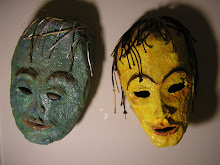9:00 PM F Theater and the Interrupted Ritual . C.S.E. Cooney, Greer Gilman, Andrea Hairston (moderator), Kenneth Schneyer. Theater theorists have put forth the idea that most theater begins with an interrupted ritual. This goes back to ancient Greek theater, which generally literally began this way, but in modern theater we see this in more subtle ways, with characters making a cup of tea or sorting the mail when someone else comes in. At Arisia 2012, Andrea Hairston talked about theater and performance being tied to spiritual practice, which resonates with the idea of the interrupted ritual. How does this idea relate to storytelling in general, and what can writers do with it?Panelists agreed most drama portrays interrupted routine, but routine not the same as ritual.
A story is usually not about an ordinary day in someone's life, but about the worst day in their life or the most extraordinary day in their life.
(I thought of A day in the life of Ivan Denisovitch as counterexample, but the point of the book was to show how extraordinary/bad the ordinary day of a Gulag prisoner was.
In Thornton Wilder's Our Town, the recently-deceased Emily wants to "visit" her old life. She is warned to return to the most ordinary day possible--but even that turns out to be too precious for her to be able to bear its loss. Still, visiting the living is not routine for a dead person.)
They said going to a theatre was a type of ritual in itself.
Andrea Hairston talked about the magic of theatre:
- How rehearsals without an audience was difficult
- How audience contributed to the transcendent experience of a performance
- How non-actors are transformed by theatre exercises, e.g. putting on a mask will free them to do things they didn't do without the mask.
- How children on Halloween have similar experiences
- That children play in order to learn how to be human. Adults feel too old for child's play, but they do theatre, or they go to sf Cons where they can play like children again.
C.S.E. Cooney said that it was still theatre, with an audience of one reader at a time.
They quoted some theatre theorist a lot, whose name I did not catch.
